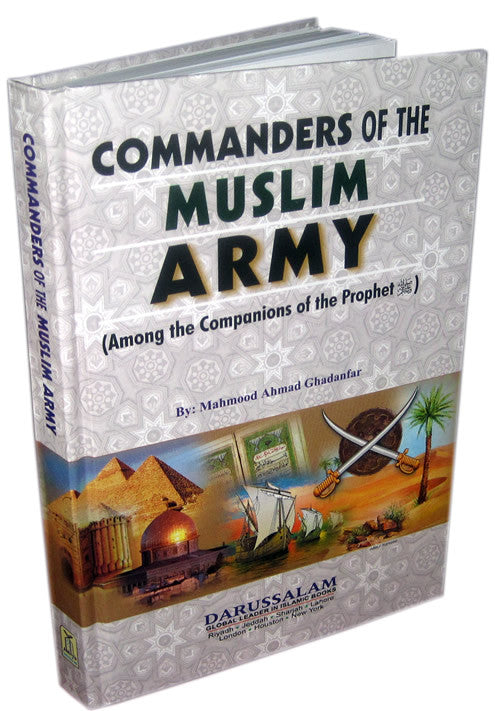
Brief Synopsis:
This book inspires Muslims with stories of Muslim Commanders who stood for Truth in many battles of Islam and fought side by side Prophet (SAW) for the glory of Eman. These brave souls set examples of war strategies, courage, leadership, devotion and sacrifice. This book presents:
- Traits of a Muslim commander: truthfulness, constancy, firmness of Faith in Allah and his blessings, dignity, valor, courage, steadfastness, eloquence, generosity, will power and many other qualities.
- Historic anecdotes from the battles of Islam with roles played by Muslim commanders.
- Separate chapters devoted to the relentless services of each of the twenty-five Muslim commanders including Khalid bin Waleed, Abu Ubaidah bin Al-Jarrah, Saad bin Abi Waqas, Amr bin Al-Aas and others.
This book not only touches upon the battles and conquests, it presents the efforts of these Commanders and companions of the Prophet in ensuring stability, provision of educational opportunities, religious, intellectual and military training in the lands they conquered. The simple language and lucid style of this book make it an enjoyable and enlightening read.
Description:
This book is about the lives of those noble Companions and Commanders who led the Islamic forces in the violent and strife-torn arenas of conflict against the Kuffar (disbelievers). They struck terror in the hearts of the enemy and the strong forts and palaces of Caesar and Chosroes trembled before their might. However in this compilation, there are not only the stories of the battlefields but also the stories of bravery and courage, valor and piety, austerity and simplicity. These stones describe the true circumstances that led the Muslims to fight snore powerful enemies than they were at that time.
Preface
All Praise is for Allah Almighty and may Allah Bless the Prophet, his family and his Companions.
This book is about the lives of those pre-eminent and noble Companions of the Prophet who led the forces of Islam in the violent and strife-torn arenas of conflict against the Kuffar or disbelievers. These were the warriors who after a vigorous training had turned to pure gold after being trained by the supreme Commander, the mercy to mankind, and the embodiment of goodness, the king of Al Madinah, Muhammad (S). Experts in the art of war were amazed and overwhelmed when they studied their exploits of bravery and valor. They struck terror in the hearts of the enemy and the stronghold sand palaces of Qaesar and Kisra trembled before their might.
They lived in austerity and simplicity, yet their style was regal. They were not cowed down by the enemy, they did not tremble before him in terror, neither could they be deterred from the pursuit of their objective. They loved death more than life in their pursuit of the righteous and true. Their gaze was modest, their hearts burned with passionate love of Allah Almighty, their arms were powerful and their feet stood surprisingly firm and steady as they fought for what their conscience told them was moral and virtuous. In whichever direction they turned, they conquered region after region. Under the leadership of the Prophet (S) they performed stunning deeds of valor and daring in the battlefields. In no time at all the stories of their great and noble exploits became the assurances of their bravery and the tales of their heroism were guarantees of their fervor and ardor. These epic stories spread in all directions. The battles fought during the Prophet's time were the most excellent and exemplary in all respects. Many time the forces of Islam faced armies which were much larger. Sometimes the opposing forces were ten times larger than the Prophet's army, and also had a larger number of superior arms and equipment, yet most often it was the forces of Islam which were victorious. Sociologists are amazed by the fact that the Islamic state started off as a small city state and, expanded at an average rate of two hundred square miles per day. Ten years later at the death of the Prophet (S) the empire of Islam was spread over an area of ten hundred thousand square miles.
When one studies the Islamic era spanning the lifetime of the Prophet (S) from the point of view of conquest and occupation of lands, their organization, management and administration, this amazement subsides. Every stage and step seems to have been patterned according to a well-defined, comprehensive and well thought out plan.
- Stability of the conquered lands.
- Education, moral and religious training of the conquered peoples.
- The education and training of the managers and administrators in morals, intellect and skills.
- An attempt to extend the limits of the Islamic Empire, by training military experts. This training was moral and intellectual. Technical know - how was not neglected either. Under their leadership the Islamic army forged their way into new territories in all directions; these were basic, innovative and revolutionary steps that resulted in astounding exploits. As a result within the short span of fifteen years after the passing away of the Prophet (S) most of the areas of the two major continents of Asia and Africa, were under the control of the Muslims.
When a student of Islamic history observes these facts, he is inevitably and deeply interested to learn about the lives of these remarkable military leaders. He would like to study their characters, their code of life and the strategies they employed. He would like to gain enlightenment from these beacons of the past in order to illuminate such light as make the world of Islam shine in the present, and also to
blaze a trail for future generations.
Human nature and the basic strategies of war normally do not change; it is for this reason that invaluable lessons can be gained even from the battles fought far back in ancient recorded history. With this purpose in mind biographical sketches of these great generals of the early years of Islam are being presented; their incredible and extraordinary military achievements have added many a glorious and golden chapter to the history of mankind.
Doubtless those great personalities who were trained by the greatest Commander of Arab and Ajam, the Sultan of Al-Madinah, the Prophet (S) himself, had been transformed by personal contact with his radiant personality. Their eyes witnessed his greatness, which had become the axis of their hearts souls and very existence. The only meaning and purpose of their lives was to achieve martyrdom in the cause of Islam. A study of the enviable lives and characters of these great generals will inspire modern day Mujdhideen,1 soldiers and military leaders with the spirit of sacrifice and Jihad.2 The battles fought during the life of the Prophet (S) introduced and made crystal-clear such principles of military strategy as had never been used in human history. The brilliance of the strategies the Prophet (S) used as the Commander-in-Chief in the battle of Badr cannot be or ignored even in the context of modern day warfare. The very first martial tactics employed by the small Islamic State in its infancy were remarkably well organized and disciplined, for the example:
- Before leaving for the battlefield a Deputy was appointed in Al-Madinah.
- The Muslim army was divided into different groups or divisions and a commander was appointed for each of these divisions.
- Qais Al Mazni Ansari was appointed to watch over the rear section of the army.
- The Muslim army reached the battlefield of Badr first and took control of the stream there, so that the enemy could not face the Muslim army for long without water.
- Even before the battle started, it was realized that the group formation of the Muslim army should be given a great deal of attention. This was because the opposing army outnumbered them three to one.
- After the formation the Prophet (S) ordered that no Mujahid should take any step on his own, and must wait for orders from him.
- He ordered that the Mujahideen should shoot their arrows only when the enemy came within range; if he was beyond their range they should not shoot. This was to avoid wastage of arms and equipment. If the enemy was very close then they should fight with their spears; if they were even closer then they should use their swords to defend themselves.
- On one occasion he pointed out to his army that they should be aware that the most effective strength and strategy lay in the practice of Rummi. This meant to practice the art of throwing. This covers all kinds of weapons of war, which are either thrown or shot. Missiles, bombs or cannons from which shots are fired - all belong to this category of weapons. Even in the changed war scenario of today, the principle of Rummi is of prime importance; as this is where the real strength of an army lies. This principle and its significant contribution to the victory and might of a military force was first enunciated by the Prophet (S). The degree of superiority and dominance of one country over another is in direct proportion to its strength and power.
- In the battle of Badr a special covered platform was erected for the Prophet , at the rear of the place where the army was deployed. The rules and principles of warfare were promulgated and declared. Women, children, people not taking part in active warfare and all senior citizens were not to be killed or harmed in any way.
-
In the battle of Uhud, the Prophet (S), inspected the battlefield and
sensing the various possibilities of danger, posted a squad of fifty archers on a mountain. They were ordered to stick to their positions under all circumstances. The vital importance of this positioning was realized when the enemy, finding this strategic position unoccupied unexpectedly attacked the Muslim army and caused significant damage. - In the battle of Ahzab, the digging of the trenches gave total protection from the enemy to Islam's first capital, Al-Madinah. This innovative and unusual move of digging trenches around a city for the purpose of protecting it astonished Abu Sufyan, the Commander of the enemy forces. Trenches are today an integral and important part of defensive fortification strategy.
All these steps enumerated above were basically innovative military strategies, which were probably introduced for the first time in human history. This book recounts the amazing exploits of the great heroes who led the first Islamic forces in battle, and had been trained by the Prophet (S). An experienced enemy and leader like Wrath Abu Sufyan had been nonplused by these innovative measures. These great martial heroes of Islam improved upon and developed the strategies and principles first enunciated by the Prophet. Even in a state of war they did not lose sight of the great moral and ethical values taught them by the Prophet (S).
Pray to Allah Almighty that He grant abundant Divine Guidance to the military experts, generals, the young soldiers and Mujahideen to follow in the footsteps of these great Companions and generals and bring back the past glories of Islam.
May Allah Almighty Shower His Blessings on the Prophet (S) and his Companions!
Mahmood Ahmad Ghadanfar
1 Mujdhideen - Those who fight in a war for Islam. (plural)
2 Jihad - a holy war for Allah Almighty and the defense of Islam and Muslims.
Table of Contents: |
|
|
|

